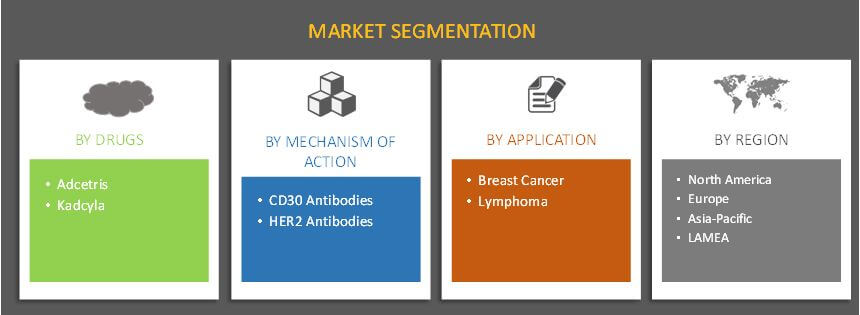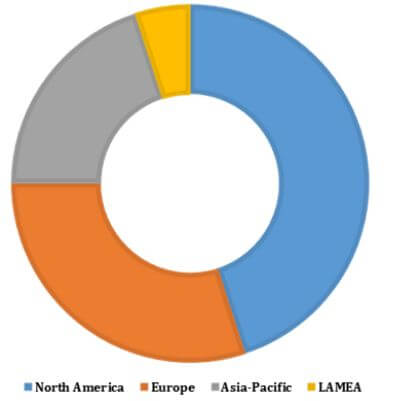Antibody Drug Conjugates Market Overview:
Antibody Drug Conjugates Market are highly effective biopharmaceutical medications designed as a targeted therapy for cancer treatment. ADC’s are designed to eliminate cancer cells only without harming the normal cells. This is a major advantage of ADC’s as the unharmed healthy cells enable patients to recover faster. The antibody drug conjugates market was valued at $1,387 million in 2016, and is estimated to reach $3,198 million by 2023, registering a CAGR of 12.9% from 2017 to 2023.
The report segments the market based on drugs, technology, mechanism of action, application, and region. Based on drugs, the market is bifurcated into Adcetris and Kadcyla. Based on mechanism of action, it is classified into CD30 antibodies and HER2 antibodies. Based on application, the antibody drug conjugates market is categorized into breast cancer, lymphoma, and others. By geography, it is analyzed across North America, Europe, Asia-Pacific, and LAMEA.
Global Antibody Drug Conjugates Market Segmentation
Increase in prevalence of cancer worldwide and unhealthy urban lifestyle and surge in consumption of tobacco and alcohol across geographies pose as major cancer risk factors. According to National Cancer Institute “the number of people living beyond cancer diagnosis is expected to reach approximately 19 million by 2024.” Increase in demand for cost-effective and quality cancer treatment is expected to drive the ADC’s market during the study period.
Global Antibody Drug Conjugates Market, by Geography, 2016 (% Share)
The report provides extensive competitive analysis and profiles of key market players, such as, include F. Hoffman-La Roche Ltd., Novartis AG, Takeda Pharmaceutical Company Limited, Pfizer, Inc., Seattle Genetics Inc., Genentech Inc., Immunogen Inc., Immunomedics, Inc., Progenics Pharmaceuticals Inc. and Bayer Healthcare Pharmaceuticals.
The other players in the value chain include Agensys, Inc., Concortis Biotherapeutics, Sanofi S.A., Celldex Therapeutics Inc., and Synthon Holding B.V.
Key Benefits :
- This report entails a detailed quantitative analysis of the current market trends from 2016 to 2023 to identify the prevailing opportunities.
- Market estimations are based on comprehensive analysis of the key developments in the industry.
- In-depth analysis based on geography assists to understand the regional market and the strategic business planning.
- The development strategies adopted by key manufacturers are enlisted to understand the competitive scenario of the antibody drug conjugates market.
Antibody Drug Conjugates Market Report Highlights
| Aspects | Details |
| By DRUGS |
|
| By MECHANISM OF ACTION |
|
| By APPLICATION |
|
| By GEOGRAPHY |
|
| Key Market Players | GENENTECH INC., BAYER HEALTHCARE PHARMACEUTICALS, SYNTHON HOLDING B.V., PFIZER, INC., CELLDEX THERAPEUTICS INC., SANOFI S.A., IMMUNOGEN INC., SEATTLE GENETICS INC., IMMUNOMEDICS, INC., PROGENICS PHARMACEUTICALS INC. |
Analyst Review
Antibody drug conjugates are highly effective biopharmaceutical medications designed as a targeted therapy for cancer treatment. Globally, in 2012 there were around 14.1 million cancer cases reported as per the data provided by the Cancer Research UK. The antibody drug conjugate market exhibits massive potential in the near future owing to the increase in prevalence of cancer across geographies. The preparation process of ADC’s involves great difficulty, inspite of these hurdles recently approved ADC’s have proved their worth for treatment of cancer. Thus, there is a strong pipeline of ADC’s that promises revolutionary changes in area of targeted therapy for cancer treatment. This market is driven by elements such as continuous improvement in the clinical data and technological advancements in the field of drug development shelling out innovative drugs into the market. Increase in demand from underdeveloped countries for cost-effective and efficient cancer treatment medication is further expected to boost the ADC’s market during the forecast period. Moreover, unhealthy urban lifestyle increases the risk of various diseases and surge in reported incidences of cancer is likely to fuel the demand of ADC’s in the study period.
Kadcyla is expected to account for largest market share in 2016 Owing to high prevalence of breast cancer while Adcetris is expected to grow at the highest rate during 2017-2023. In 2016, the breast cancer segment accounts for largest market share in the application area due to high number of reported cases of breast cancer globally.
North America accounted for major market share in the global ADC’s market in 2016 owing to high adoption of ADC’s and substantial purchasing power of the patient populace in the region. European region demonstrates somewhat similar potential and is reported to be the second largest ADCs market on the global platform. Asia-Pacific and LAMEA are expected to offer lucrative opportunities to market players in the near future. Countries, such as Brazil, India, China, and few others, are expected to pose as lucrative investment destinations for manufacturers of ADCs.
Loading Table Of Content...






